

LinkedIn : 25 choses à savoir sur l’algorithme des publications. L’algorithme de LinkedIn fait couler beaucoup d’encre.

On ne compte plus les articles, vidéos, posts voire livres blancs sur le sujet. Quand on est sur LinkedIn, il intervient à 2 niveaux: le profil et sa visibilité, et les publications. J’ai créé la démarche 3BE sur LinkedIn: BE Found, BE Seen et BE in touch. L’algorithme concerne essentiellement les 2 premiers leviers: BE Found et BE Seen. BE Found, c’est la visibilité du profil.
BE Seen, c’est votre visibilité via votre contenu et vos interactions. BE In Touch, c’est l’approche directe par le moteur de recherche et des invitations. I’m Betting on “Weak Links” for My Next Career Move: You Should Too. I’ve just had a break-neck, jam-packed conversation with the engaging (and uber-clever) family friend.

As he is steeped in the Silicon Valley sub-culture, I was regretting that I didn’t have a cheat sheet handy. I am as well-informed concerning Silicon Valley (if you compare my grasp to the HBO series) as the next organizational psychologist — and as a result of one current gig, even slightly ahead of the pack. However, I was regretting a dose of Benadryl for spring allergies, as he launched into a perfectly inspiring explanation concerning how he landed his new role. We discussed “weak links” and “progressive ambition” (more on these below) — topics which will likely impact most of our career paths going forward. Don’t Waste Your Time on Networking Events. Large, traditional business networking events are a time-honored institution.

They have been a staple of aspiring and successful professionals for so long that most networking advice focuses not on whether you should attend, but on how to make the most of these events when you do attend. In theory, they’re one of the best ways to grow your business. Why You Shouldn't Underestimate Your Personal Network. A personal network can be a powerful thing, so long as you use it correctly.
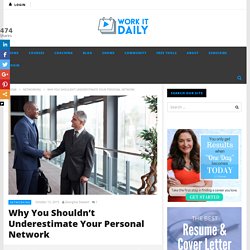
It is especially useful when searching and applying for jobs. Ft. Premium Digital All the benefits of Standard Digital, plus: Unlimited access to all content Instant Insights column for comment and analysis as news unfolds FT Confidential Research - in-depth China and Southeast Asia analysis ePaper - the digital replica of the printed newspaper Full access to LEX - our agenda setting daily commentary Exclusive emails, including a weekly email from our Editor, Lionel Barber Full access to EM Squared- news and analysis service on emerging markets Standard Digital Access to FT award winning news on desktop, mobile and tablet Personalised email briefings by industry, journalist or sector Portfolio tools to help manage your investments FastFT - market-moving news and views, 24 hours a day Brexit Briefing - Your essential guide to the impact of the UK-EU split Digital Trial For 4 weeks receive unlimited Premium digital access to the FT's trusted, award-winning business news.

7 Great Ways to Start a Conversation With Anyone [VIDEO] 5 Reasons You DON'T Need an Elevator Pitch. 3 changes to get more 'yes' answers to your networking requests. Please tell me you’ve read Adrian J.
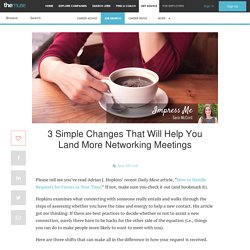
Hopkins’ recent Daily Muse article, “How to Handle Requests for Favors or Your Time.” If not, make sure you check it out (and bookmark it). Hopkins examines what connecting with someone really entails and walks through the steps of assessing whether you have the time and energy to help a new contact. His article got me thinking: If there are best practices to decide whether or not to assist a new connection, surely there have to be hacks for the other side of the equation (i.e., things you can do to make people more likely to want to meet with you). Here are three shifts that can make all in the difference in how your request is received. 1. How to Reach Out to Powerful People and Develop a lasting Relationship : 7 Tips. (Oddly enough) I regularly receive emails from readers who wants to know how to reach powerful people.
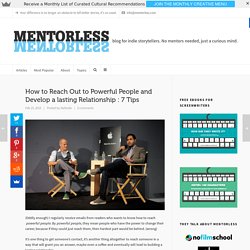
By powerful people, they mean people who have the power to change their career, because if they could just reach them, then hardest part would be behind. (wrong) 5 attitudes pour devenir un networkeur charismatique. (1/6) Vous débarquez dans cet événement réseau sans connaître grand monde et avec une certaine appréhension.
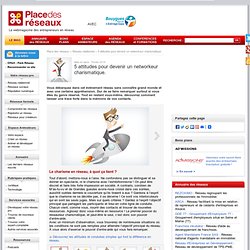
Dur de se faire remarquer surtout si vous êtes du genre réservé. Tout en restant vous-même, découvrez comment laisser une trace forte dans la mémoire de vos contacts. Tout d’abord, mettons-nous à l’aise. Ne confondons pas se distinguer et se donner en spectacle, ni le charisme avec l’exhibitionnisme ! On peut être discret et faire très forte impression en société. Découvrez les attitudes et conduites simples qui font la différence en réseau. Fastcompany. Friends make life better, and work is an easy place to meet potential friends for a simple reason: We spend a lot of our lives there.
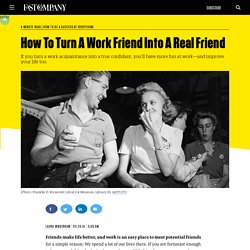
If you are fortunate enough to have a work friend who is also a real, rest-of-life friend, you score several upsides. These friends are "uniquely empathetic," says Jessica Methot, assistant professor of human resource management at Rutgers University, "they make the workplace a lot more fun," and they improve job performance as you gain access to information and networks. Yet turning work acquaintances into true confidants can be tricky. You have to change the boundaries of the relationship and navigate office complexities. Why Having Friends At Work Is So Important. Fact: we spend most of our days at work.
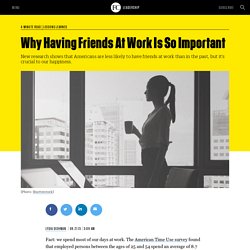
The American Time Use survey found that employed persons between the ages of 25 and 54 spend an average of 8.7 hours working or in work-related activities, and 7.7 hours sleeping. But the reality for many is that the workweek extends more than the standard 40 hours, and the average U.S. employee only takes about half (51%) of their eligible paid time off. Given all that time spent in close proximity to colleagues, it’s surprising that Americans are less likely to have friends at work now than in years past. As Adam Grant notes in his column in the New York Times: La clé de la réussite : politesse et savoir-vivre. Culture et jeunesse. How to Be Truly Generous: 9 Things Genuinely Kind People Always Do. Glogin?URI= Educating Children with Autism. Celeste Headlee: 10 ways to have a better conversation. All right, I want to see a show of hands:how many of you have unfriended someone on Facebookbecause they said something offensive about politics or religion,childcare, food?
(Laughter) Définition Networking Final. Le networking, plus communément appelé réseautage, est une technique permettant de rentrer en relation avec un grand nombre de personnes pour constituer ce que l’on appelle un réseau. Il devient ainsi possible de profiter des connaissances de chacun de vos contacts au sein du réseau et ce dans le cadre d’intérêts communs. Le networking permet d’accéder à des opportunités professionnelles au travers d’un large réseau d’affaires. Comment se met en place un networking et quel en est l’intérêt ? Social networking et business networking. Forbes Welcome. The Predictive Index. The Secret to Smart Groups Isn't Smart People—It's Women. The concept of "general intelligence"—the idea that people who are good at one mental task tend to be good at many others—was considered radical in 1904, when Charles Spearman proposed the theory of a "g factor.
" Today, however, it is among the most replicated findings in psychology. But whereas in 1904 the U.S. economy was a network of farms, mills, and artisans, today's economy is an office-based affair, where the most important g for many companies doesn't stand for general intelligence, but, rather, groups. So, what makes groups smart? Is there any such thing as a "smart" group, or are groups just, well, clumps of smart people? As a team of scientists from MIT, Carnegie Mellon, and Union College write in this Sunday's New York Times, research suggests that just as some individuals are smarter than others, some groups are smarter than others, across a range of tests and tasks. How To Make Small Talk That Doesn't Confuse Or Offend Your International Colleagues. On a trip to Moscow, one of my Russian colleagues whispered to me, "Erin, you might want to smile less while in public.
" When I looked questioningly at her, she responded, "We Russians have a saying: 'If a person smiles at you on the street, you know that that person is either crazy—or American.'" Different cultures use different types of behavior when they interact with strangers for the first time. That can dramatically increase the stakes on some of the early encounters between international colleagues and potential business partners.